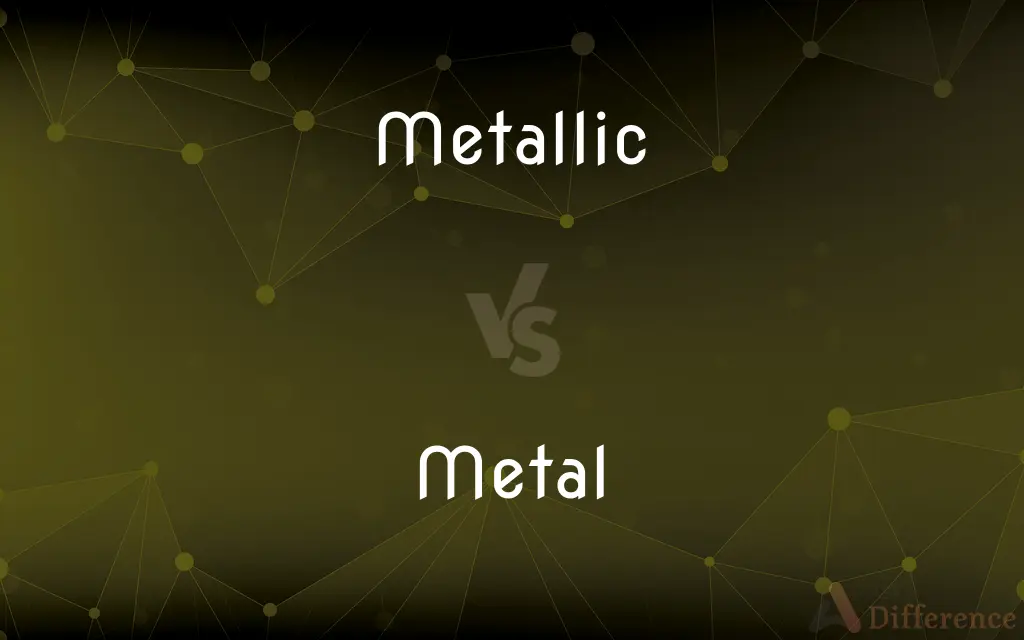Metallic vs. Metal — What's the Difference?
By Fiza Rafique & Maham Liaqat — Updated on March 18, 2024
Metallic refers to the characteristic qualities or appearance of metals, such as luster and conductivity, while metal denotes a category of elements that share these properties.

Difference Between Metallic and Metal
Table of Contents
ADVERTISEMENT
Key Differences
Metallic describes attributes or appearances that resemble metal, including shininess, density, and conductivity. Metals, on the other hand, are chemical elements that inherently possess these metallic properties, such as iron, gold, and silver.
Metallic is often used in contexts beyond pure chemistry, to describe colors, finishes, or textures in art, fashion, and manufacturing that mimic those of metals. Metals, whereas, are primarily discussed within scientific, industrial, and economic contexts, focusing on their use as materials with distinct physical and chemical properties.
The term metallic can apply to both materials that are metal and non-metal, as long as they exhibit metal-like characteristics. Metals, however, are strictly defined by their position on the periodic table and their specific set of physical and chemical properties, such as electrical conductivity and malleability.
While metallic characteristics can be engineered or imitated in various materials, such as metallic paint or fabrics, metals are naturally occurring elements or alloys that cannot be artificially produced but can be extracted and refined from their ores.
In essence, "metallic" serves as an adjective describing anything that resembles or pertains to metal in appearance or qualities. Metals, on the other hand, are the actual substances that exhibit these metallic properties and are categorized as such based on scientific criteria.
ADVERTISEMENT
Comparison Chart
Definition
Pertaining to or resembling metal
A class of elements with conductive, malleable, and ductile properties
Nature
Descriptive attribute
Physical substance
Context of Use
Aesthetic, descriptive
Scientific, industrial
Examples of Application
Paint finishes, fabric colors
Construction materials, electrical wiring
Relation to Metal
Describes qualities resembling metals
Comprises the substances themselves
Compare with Definitions
Metallic
Reflective or shiny like a metal.
The dress's metallic fabric caught the light beautifully.
Metal
A material that is typically hard.opaque.and shiny.
The sculpture was made entirely of recycled metal.
Metallic
Containing metal particles.
The ink used in this pen is metallic, giving it a unique shimmer.
Metal
A category of music characterized by heavy use of electric guitars and drums.
Metal music often features complex guitar solos.
Metallic
Pertaining to the characteristics of metal.
The car's paint had a metallic sheen.
Metal
Elements that are good conductors of electricity and heat.
Copper is a metal used extensively in electrical wiring.
Metallic
Relating to metal music.
They prefer metallic sounds in their playlist.
Metal
Elements that form positive ions and have metallic bonds.
Sodium is a soft.highly reactive metal.
Metallic
Imitating the sound of metal.
The sculpture emits a metallic clang when struck.
Metal
Alloys or pure substances that exhibit metal characteristics.
Brass is a metal made from copper and zinc.
Metallic
Relating to or resembling metal or metals
Metallic alloys
A curious metallic taste
Metal
A metal (from Greek μέταλλον métallon, "mine, quarry, metal") is a material that, when freshly prepared, polished, or fractured, shows a lustrous appearance, and conducts electricity and heat relatively well. Metals are typically malleable (they can be hammered into thin sheets) or ductile (can be drawn into wires).
Metallic
A paint, fabric, or colour with a metallic sheen
Ultra-bright solid colours, pearls, metallics, and more
Metal
A solid material which is typically hard, shiny, malleable, fusible, and ductile, with good electrical and thermal conductivity (e.g. iron, gold, silver, and aluminium, and alloys such as steel)
Being a metal, aluminium readily conducts heat
An adjustable pole made of metal
Metallic
Of, relating to, or having the characteristics of a metal.
Metal
Broken stone for use in making roads
The work also involves dealing with rock aggregates for potential use as suitable road metal
Metallic
Containing a metal
A metallic compound.
Metal
Molten glass before it is blown or cast.
Metallic
Lustrous; sparkling
Metallic colors.
Metal
Heavy metal or similar rock music
Crunching power-trio metal
Industrial music is also a blend of metal and techno
Metallic
Sharp-tasting
An unpleasant, metallic flavor.
Metal
Made from or coated with metal
A range of metalled key rings
Metallic
Harshly resonant
"the strange metallic note of the meadow lark, suggesting the clash of vibrant blades" (Ambrose Bierce).
Metal
Make or mend (a road) with road metal
The road was metalled and tolls charged for the upkeep
Follow the metalled road for about 200 yards
Metallic
A yarn or fiber made of, containing, or resembling metal.
Metal
Any of a category of electropositive elements that usually have a shiny surface, are generally good conductors of heat and electricity, and can be melted or fused, hammered into thin sheets, or drawn into wires. Typical metals form salts with nonmetals, basic oxides with oxygen, and alloys with one another.
Metallic
A fabric, typically shiny or iridescent, made of such yarn or fiber.
Metal
An alloy of two or more metallic elements.
Metallic
Of, relating to, or characteristic of metal.
Metal
An object made of metal.
Metallic
Made of or containing metal.
Metal
Basic character; mettle.
Metallic
(of a sound) Harsh, as if coming from two metals striking one another.
Metal
Broken stones used for road surfaces or railroad beds.
Metallic
(of a color) Having the appearance of being of polished metal.
Metal
Molten glass, especially when used in glassmaking.
Metallic
A metallic color.
Metal
Molten cast iron.
Metallic
Of or pertaining to a metal; of the nature of metal; resembling metal; as, a metallic appearance; a metallic alloy.
Metal
(Printing) Type made of metal.
Metallic
Of, pertaining to, or characterized by, the essential and implied properties of a metal, as contrasted with a nonmetal or metalloid; conductive of electricity; basic; forming positive ions in solution; antacid.
Metal
(Music) Heavy metal.
Metallic
Containing or made of or resembling or characteristic of a metal;
A metallic compound
Metallic luster
The strange metallic note of the meadow lark, suggesting the clash of vibrant blades
Metal
To cover or surface (a roadbed, for example) with broken stones.
Metal
(heading) Chemical elements or alloys, and the mines where their ores come from.
Metal
Any of a number of chemical elements in the periodic table that form a metallic bond with other metal atoms; generally shiny, somewhat malleable and hard, often a conductor of heat and electricity.
Metal
Any material with similar physical properties, such as an alloy.
Metal
(astronomy) An element which was not directly created after the Big Bang but instead formed through nuclear reactions; any element other than hydrogen and helium.
Metal
Crushed rock, stones etc. used to make a road.
Metal
(mining) The ore from which a metal is derived.
Metal
(obsolete) A mine from which ores are taken.
Metal
(tincture) A light tincture used in a coat of arms, specifically argent (white or silver) and or (gold).
Metal
Molten glass that is to be blown or moulded to form objects.
Metal
(music) A category of rock music encompassing a number of genres (including thrash metal, death metal, heavy metal, etc.) characterized by strong drum-beats and distorted guitars.
Metal
The substance that constitutes something or someone; matter; hence, character or temper.
Metal
The effective power or calibre of guns carried by a vessel of war.
Metal
The rails of a railway.
Metal
The actual airline operating a flight, rather than any of the codeshare operators.
We have American Airlines tickets, but it's on British Airways metal.
Metal
(music) Characterized by strong drum-beats and distorted guitars.
Metal
Having the emotional or social characteristics associated with metal music; brash, bold, frank, unyielding, etc.
Metal
To make a road using crushed rock, stones etc.
Metal
An elementary substance, as sodium, calcium, or copper, whose oxide or hydroxide has basic rather than acid properties, as contrasted with the nonmetals, or metalloids. No sharp line can be drawn between the metals and nonmetals, and certain elements partake of both acid and basic qualities, as chromium, manganese, bismuth, etc.
Metal
Ore from which a metal is derived; - so called by miners.
Metal
A mine from which ores are taken.
Slaves . . . and persons condemned to metals.
Metal
The substance of which anything is made; material; hence, constitutional disposition; character; temper.
Not till God make men of some other metal than earth.
Metal
Courage; spirit; mettle. See Mettle.
Metal
The broken stone used in macadamizing roads and ballasting railroads.
Metal
The effective power or caliber of guns carried by a vessel of war.
Metal
Glass in a state of fusion.
Metal
The rails of a railroad.
Metal
To cover with metal; as, to metal a ship's bottom; to metal a road.
Metal
Any of several chemical elements that are usually shiny solids that conduct heat or electricity and can be formed into sheets etc.
Metal
A mixture containing two or more metallic elements or metallic and nonmetallic elements usually fused together or dissolving into each other when molten;
Brass is an alloy of zinc and copper
Metal
Cover with metal
Metal
Containing or made of or resembling or characteristic of a metal;
A metallic compound
Metallic luster
The strange metallic note of the meadow lark, suggesting the clash of vibrant blades
Common Curiosities
What defines a material as metallic?
A material is considered metallic if it exhibits characteristics typical of metals, such as shininess, density, and conductivity.
Is metallic a physical or chemical property?
Metallic is a term that describes physical properties, such as luster and conductivity.
Can non-metals be described as metallic?
Yes, non-metals can have a metallic appearance or qualities, such as luster or a reflective surface, without being actual metals.
Are all metals naturally occurring?
Most metals are naturally occurring elements, but some, like technetium, are artificially produced.
Can metals exist in liquid form?
Yes, metals like mercury are liquid at room temperature, and others can melt to become liquid at high temperatures.
What are examples of metallic uses in everyday life?
Metallic finishes on cars, metallic paint in art, and metallic fabrics in fashion are common examples.
What is the significance of metals in technology?
Metals are crucial for technology, used in electronics, machinery, and infrastructure due to their conductive and durable properties.
How is the term metallic used in music?
In music, metallic describes sounds that are harsh or reminiscent of metal clashing, and it also refers to a genre of rock music known as metal.
What is the environmental impact of metal extraction?
Metal extraction can have significant environmental impacts, including habitat destruction, pollution, and resource depletion.
How are metals classified?
Metals are classified based on their physical and chemical properties, such as being conductive, malleable, and ductile.
How does metallic paint mimic the appearance of metals?
Metallic paint contains tiny metal flakes that reflect light, giving the paint a surface that mimics the luster of metal.
How are metals and metallic materials different in fashion?
In fashion, metallic materials refer to fabrics or finishes that mimic metal's luster, whereas metals might be used in accessories or hardware.
Can metals be recycled?
Yes, metals can be recycled without losing their properties, making them sustainable materials for various uses.
What role do metals play in electrical conductivity?
Metals are excellent conductors of electricity due to their free electrons, making them vital for electrical wiring and components.
Are metallic properties the same as metal properties?
Metallic properties refer to the resemblance to metal's characteristics, while metal properties are inherent to metal elements and compounds.
Share Your Discovery

Previous Comparison
Princess vs. Prince
Next Comparison
Parcel vs. PackageAuthor Spotlight
Written by
Fiza RafiqueFiza Rafique is a skilled content writer at AskDifference.com, where she meticulously refines and enhances written pieces. Drawing from her vast editorial expertise, Fiza ensures clarity, accuracy, and precision in every article. Passionate about language, she continually seeks to elevate the quality of content for readers worldwide.
Co-written by
Maham Liaqat













































